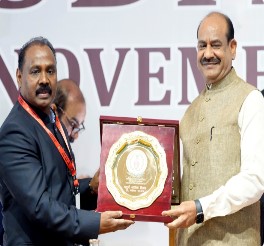India-Japan script an expanding partnership for a shared future
Mediawire
New Delhi [India], July 27: India and Japan are identifying new technology areas to widen partnership, create new industries and reinvigorate the existing ones.
Technology is redefining the Indo-Japanese partnership. The two nations are looking to tap into the opportunities presented by Japanese startups as well as large corporations, which are looking for technology and services partnerships to present their solutions to the world.
During his visit to India, the Economy, Trade and Industry Minister Yasutoshi Nishimura emphasised the key pillars that are driving the rapidly expanding business relationship between the two countries. With innovation and partnership, he stressed on how the two countries could exploit the opportunities for growth for trade between them and for making an impact around global markets.
While companies from the two countries are expanding their business cooperation, the two are working on a three-pronged strategy for expanding their business relationship.
Creation of future industries: India and Japan have identified cutting edge areas like digital services, clean energy, healthcare, mobility and electric vehicles and aerospace as areas of cooperation. Japan has also stressed on the collaboration between the startups of the two countries.
“Together we will open up the future of the world. I would like to realise such Japan-India cooperation. Specially in the field of semiconductors, today we are taking the first steps towards cooperation with India,” Nishimura said, outlining his vision for the shared future.
During the visit, Minister Nishimura and Minister for Electronics and Information Technology Ashwini Vaishnaw signed a memorandum of cooperation for semiconductor design, manufacturing, equipment research, talent development, and bringing resilience to the semiconductor supply chain, to enhance bilateral cooperation in this sector. That had set the ball rolling for companies to ideate on finding the business opportunities in semiconductors and relevant fields.
Expanding scale of conventional industries: Steel, textiles, SMEs and other sectors could be potential areas for collaboration. As steel industry needs to decarbonise, Japan and India could work together to chart a new course for India’s expanding steel manufacturing sector. Japan is already working to improve the competitiveness of India MSME sector.
Entering new markets: Several Japanese companies are making India their manufacturing base for exports, which contributes to India’s ‘Make for World’ initiative. With enhanced cooperation between the two, Japanese technology edge can combine with Indian companies to open new markets. Financial support for export to third countries by Japanese companies from India is already being discussed. The partnership could open new markets like Africa.
OPPORTUNITIES UNLIMITED
While both nations are looking to expand their collaboration in these areas, nearly 1400 Japanese companies that operate in India can look to ride this opportunity in partnership with India. Last year Suzuki achieved its all-time high exports to Latin America and Africa. Daikin has announced plans to export air conditioners manufactured in India to 100 countries. Kubota is looking to expand to African markets as part of the India-Japan alliance.
Indo-Japan Digital Partnership aims to promote projects for digital transformation, which only widens the scope for partnership.
India energy ambition has been taking a radically different shape as it puts into place a strategy for becoming energy independent by 2047 and achieving net zero carbon emission by 2070. Increasing renewable usage is central to the planned energy transition. Green Hydrogen (GH) holds the promise as one of the alternatives to enable this transition.
In March 2022, the two countries announced the Clean Energy Partnership with the commitment of enhance energy cooperation between the two countries. With the two governments laying the ground for expanding the cooperation, the list of emerging sectors for expanding the business relationship is long – hydrogen and ammonia, biofuel, CCUS, sustainable transport and electrical vehicle and battery, energy efficient buildings, and more.
At the Indo-Japan Deeptech Innovation and Clean Energy Seminar last week, a number of startups from Japan also joined in, detailing their business. These startups companies are working in various technological fields such as healthcare, AI, agritech, energy and mobility, and drones.








